This is an ongoing list where I attempt to do the following: Play, Complete, and Rank every video game in the known universe in order to finally answer the age old question "What is the greatest game of all time?" For previous entries find the links on the attached spreadsheet.
How did I do?
| Category | Completion level |
|---|---|
| Beat the story | Twice with each character |
| Brawls? | Once with each character |
| In-game achievements earned? | 0 |
| Time Played | 15-20 |
I need to admit something. I am not great at deck building games, I love playing them, but I am not the type of person who will analyze my deck and perfect it to the point where I only have usable cards. The best example I can give is that when I was a kid, 10-12, I played magic with my older brother. I only played a green creature deck and I loved all of the creatures so much that I never trimmed my deck down. When I got a new card I liked, it went in the deck. So, when I would play my brother or his friends, my deck was like 100 cards and theirs would be down to like 40-50. That is how I approach deck building games. When I draft a card I always imagine that best use for it, and not what it will look like when it shows up in my hand with less than ideal circumstances.

Griftlands was a game that intrigued me the very first time I saw Brad do an early access look at the game. I told myself that this was a game to keep an eye on, and that name stuck with me that when it finally showed up on Switch, I knew I was going to get it day one. Now I'm here to talk (write) to you (blog) about it and see where it ranks on our list.
I would describe Griftlands as a rouge-like, deck building, choose your won adventure game. You start the game by picking one of three scenarios (you start with one and unlock the other two), in which your main goal is to survive through several days of adventuring until you can defeat the final boss of each encounter. Griftlands' uniqueness is in its ability to not only let you steer the story, build relationships with NPCs, but also in the fact that you have two decks to manage that can grow and change based on decisions you make throughout the game. It can honestly be a lot to wrap your head around, so I will try to explain it the best I can.
In the first campaign you play as Sal who is back in town and looking for revenge. Your goal is to kill someone who is going to be attending an auction 5 days from now, but you need to find a way into the auction so that you can put yourself in position to actually kill them. In order to do that you need friends and contacts. The game is always pushing you along the same story path, and if you complete the run you will always end the game at the auction (in this example). However, Griftlands has a semi-open choose your own adventure aspect, where there is almost always two paths to follow. At the start of the game you are given the names of two people who have odd jobs that need completing. These two quests are randomly generated, so they won't appear on every run, but you can only choose one to get started. Do you want to pick the quest that has the biggest reward, or perhaps one that favors negotiation over combat? As you play through the game, nearly every small point in the story has these choice moments. While they sometimes are meaningless choices in the grand scheme of things, Griftlands also has a relationship meter with EVERY SINGLE character in the game. So, while you might find yourself picking between two jobs that are offering the same rewards and use the same deck, you might skew to helping out one person versus the other because of trying to build relationships.
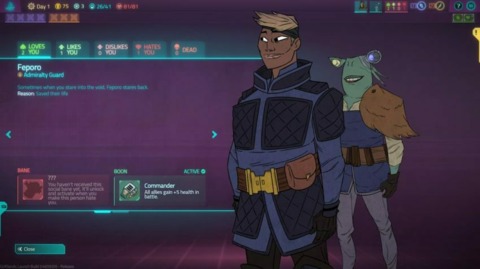
The relationship status is fairly linear, everyone starts as neutral to you (outside of story characters) and can either move to like and love, or dislike and Hate. If a character likes you, they might offer you a discount if they operate a store or join you in a negotiation to offer support. A character that dislikes you may do the opposite and charge more, or support anyone going against you. Missions that randomly come up later that use these characters (if they come up at all) might be harder or easier to complete based on the people involved. However, the main draw here is to get people into the Love status and avoid the Hate status. If someone hits either extreme they offer a permanent boon or curse to you throughout your playthrough. Get a merchant to love you, and they will give you a permanent discount to all shops. If perhaps an Admirality (police force) hate you, they will add increased damage to all cops you take on in battle. Its a fun mechanic that can turn the tables in either direction in how you play, and players can swing their status based on choices you make. Sure, completing jobs for people will make them like you, but if you kill someone, their friend will hate you even if they weren't a part of that quest at all. For good and bad I found this was the part of the game I was most interested in. While it is very linear, I loved seeing what each character's benefit or curse was, and once you unlock it for one playthrough, you will know for next time if it worth it on other playthroughs, because the game keeps a record as to what this person did when they loved/hated you.
Of course the MAIN part of the game is the actual playing of cards. Here is where your two decks come into play. If you are attacking or defending you use your combat deck. While if you are trying to use your charisma or speech to get through, you use a negotiation deck. Regardless of which deck you use, should you win the challenge, you get experience on the cards you played, as well as the chance to draft a new card for the deck. So, if you win a lot at negotiations, your negotiation deck will continue to get stronger as your cards level up and you get to pick new cards to keep. The card games themselves play slightly differently, but the concept is the same. A combat encounter will see you on the battlefield against one or more foes and you are playing cards that either do damage, add defense, or make status changes. Each card has a cost associated with it, and on average you only have 3 moves you can make before your turn ends. In negotiations you are trying to destroy your opponent's main argument, while protecting your own. If either argument is destroyed that person loses, however you can play cards to not only attack or defend, but to create smaller arguments that can add bonuses or boons on the board. These smaller arguments can then be attacked or defended as well, but if they are destroyed are just removed from battle but the negotiation continues. The biggest difference in the two encounters is that if you lose in combat, it is game over, but if you lose in negotiations that just means you lost the negotiation. Each has its own persistent health meter which stays damaged until the end of each day (or until you heal it), but should you lose a negotiation, you can continue playing, but you won't be able to negotiate with anyone until it has been healed up. This can mean you lose quests that require negotiations (meaning you don't get the rewards) or can make missions harder because you can't convince people to help you, etc.
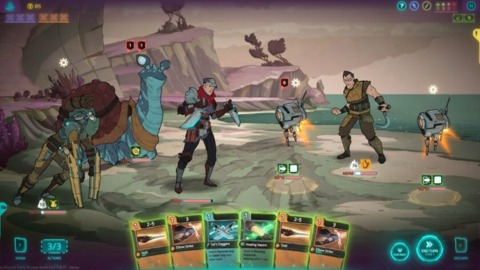
There is a lot to unpack here, and I don't necessarily want to get bogged down in the card details, but each of the playable characters has a different style to how they operate, which will impact how you play them. Rook (the second campaign) has his negotiations center around a coin that he flips that can boost certain cards in his hand. It starts off as adding random chance into negotiations (much more than either other character) but the coin you use can be exchanged out where you can then build your deck based on what coin you are going to use. Like with any game with different playstyles there are going to be ones you gel with and understand, and ones that always feel like a struggle to play.
While Griftlands is far from an open world, there are usually 2-3 extra places you can go where you can spend money at the shops to modify your deck, buy relics that offer permanent benefits for a run, or rent a travelling companion to help in fights and negotiations. About a day into each campaign a shop opens that allows you to pay for bonuses that carry over from run to run to fulfill its rouge-like requirements. Here you can increase your max health, start with more money, or even increase the speed at which your special meter fills (yeah I didn't mention you have a special for both combat and negotiations). While you don't get to carry over your deck, relationships, or relics from run to run, I found that if I was really struggling having little boosts to health and money can get you a little bit further.
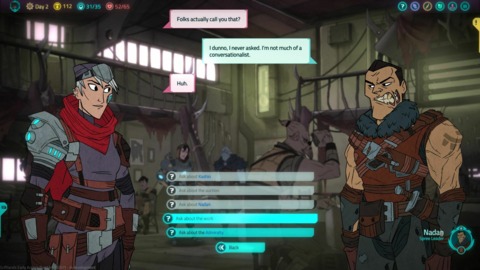
Griftlands does have some flaws in it, that despite enjoying the game I can realize detract from its appeal. The biggest issue I have is what I will call the Deus Ex problem. You are led to believe that you can forge your own path and solve problems how you see fit, using either negotiations or combat decks. However, there are mandatory boss fights that only use the combat deck, and while that is far from surprising, it does mean that in order to win these campaigns you kind of have to play the game a certain way. You won't beat the run if you don't spend time leveling up your combat deck. You will need upgraded cards and frankly better cards then what you start with to win, and again that is probably expected it does mean that you will have to actively choose to fight in missions even when another option exists. The first run I had, I played with the goal of trying not to piss anyone off, which means I did a lot of negotiations and very little fighting, because wouldn't you know it, people don't like getting beat up. It also meant that by doing so I had an incredibly powerful negotiation deck, and I could win against enemies who had double my health bar, because I had great cards for it. However, then I was forced into a boss battle at the end of day 3 (for Sal) and I couldn't talk my way out of it and got whooped. Knowing that all bosses have to be fought means that you can have the opposite approach and still win the game. If you fight everyone and build up a powerful combat deck, you will never run into a situation where you have to use the negotiation deck, so its not even a balance issue. This is me harping on one issue, but the game gives a false promise that you can handle missions the way you want to, but in reality, that isn't true.
The big other issue I have is that, the story will always play out relatively the same, which hurts its replay-ability. Griftlands has a difficulty setting that every time you beat the game you unlock a new difficulty. Beat it on difficulty 1 and get 2, etc. As someone who isn't looking to maximize the perfect deck build, there are few reasons to keep playing it over to unlock harder difficulties. Each campaign has maybe 3 big story branching paths, that means you could feasibly play through 3 times and see everything you want to see, but outside that, you will know which path gives you the best results you want and just keep playing the story in the same direction. While some would argue that the point of rogue-likes is to play it over for the challenge, to see if you can beat it again with different cards/relics/relationships, etc. I would counter that Griftlands actually has a pretty in your face story, with good writing, and while you can skip cutscenes, you will potentially find yourself tiring out faster then say "Slay the spire" where there is no story and just endless runs to be had.
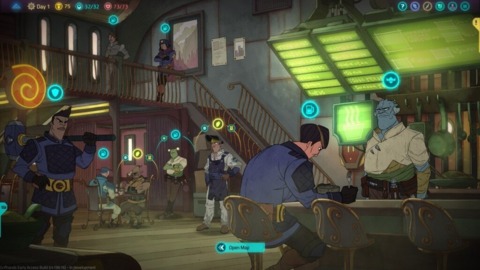
Super quick, but can we talk about the in-game achievements. They are incredibly hard to earn. Even ones that I tried to actively go for, I ended up failing at. These are for some truly determined players with maxed out characters, because I can't imagine trying to play a game where 20 people hated me (thats 20 curses on you), or beat a boss without ever playing an attack card. I'm sure there are videos online of people tackling these, I don't care enough to look up or watch, but I do feel these are not your normal achievements and ones you can just stumble into, you have to specifically try and tackle these for a whole run.
Griftlands does offer that in terms of "brawls" which you unlock after beating the story for any character, but it is just a sped up version of the story with no decisions you make and no story or dialogue. However, even as I may have tired of the story on characters that took me awhile to beat, brawls seemed to lack any of the charm of the game. I couldn't go to shops, or try to make people like me to hopefully influence a mission down the road, it was just me, my decks, and generic NPC 1 and 2. It seems more likely to attract people who are trying to build the perfect deck and test it out, and wasn't for me.
All in all, I enjoyed my time with Griftlands. I was constantly playing it when it came out, and then started dropping off when I got to the 3rd campaign, but I'm still glad I played it. Based on what I have seen after the fact, I don't think it will catch on like other deck builders, and that is a shame because I certainly think it is one of the better ones I have played.
Is this the greatest game of all time?: No
Where does it rank: It's good, and easily one of the best games I beat this year, but this certainly won't be for everyone. I have it ranked at #15 out of 66 games. It sits right above Yakuza Kiwami 2 and right below Fire Emblem: Three Houses.
Up Next: Tony Hawks 1 & 2 remake (PS4)
Anyone looking for it: here is the link to the list and more if you are interested in following along with me (this is not a self promotion). Here. I added links on the spreadsheet for quick navigation. Now if you missed a blog of a game you want to read about, you can get to it quickly, rather than having to scroll through my previous blogs wondering when it came up.
Thanks for Listening.
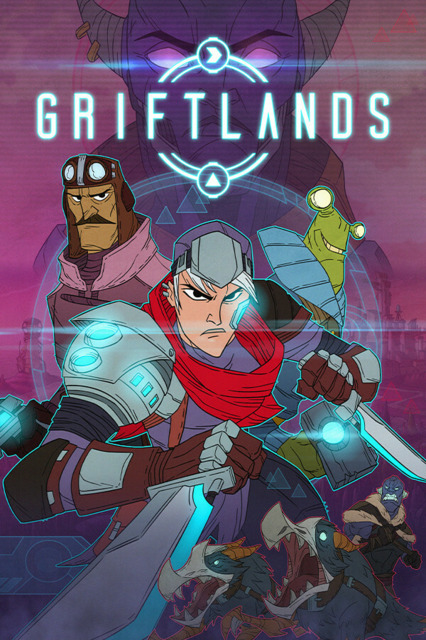
Log in to comment